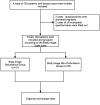Evaluating Body Image Disturbance and Its Influencing Factors in Breast Cancer Patients Following Unilateral Mastectomy
- PMID: 39772297
- PMCID: PMC11744373
- DOI: 10.5152/pcp.2024.24953
Evaluating Body Image Disturbance and Its Influencing Factors in Breast Cancer Patients Following Unilateral Mastectomy
Abstract
Background: Patients with unilateral breast loss after single mastectomy for breast cancer may have body image disorders such as surgical lymphedema, flap ischemia, and spinal deformity, resulting in negative emotions such as depression, inferiority, and social dysfunction. This study mainly investigated and analyzed the status quo and influencing factors of body image disorder in breast cancer patients after single mastectomy.
Methods: This study is a cross-sectional study. Breast cancer patients admitted from May 2023 to April 2024 were selected as the research subjects. Data were collected with a general information questionnaire, the Body Image Scale (BIS), the Self-Image Scale, the Self-Acceptance Questionnaire, and the Perceived Social Support Scale. Based on the scores, the research subjects were divided into a body image disturbance group and a non-disturbance group. Univariate and multiple logistic regression analyses were conducted to analyze the influencing factors of body image disturbances in breast cancer patients.
Results: One hundred fifty questionnaires were distributed in this study, and 146 valid questionnaires were collected. Among the 146 patients, 51 (34.93%) experienced body image disturbances after surgery, while 95 (65.07%) did not. The results of univariate and multiple logistic regression analyses showed that educational level, lymphedema in the affected limb, intimate relationships, self-image, self-acceptance, and perceived social support scores were independent risk factors for body image disturbances in breast cancer patients after surgery (P < .05).
Conclusion: Body image disturbances in breast cancer patients who undergo unilateral mastectomy need further improvement. Educational level, lymphedema in the affected limb, intimate relationships, self-image, self-acceptance, and perceived social support are the main influencing factors.
Conflict of interest statement
Figures
References
-
- LIU J, PANG K, HE F. Weighted gene co-expression network analysis identifies a novel immune-related gene signature and nomogram to predict the survival and immune infiltration status of breast cancer. BIOCELL. 2022;46(7):1661 1673. (10.1016/j.annonc.2023.11.016) - DOI
-
- FAN K, WENG J. The progress of combination therapy with immune checkpoint inhibitors in breast cancer. BIOCELL. 2023;47(6):1199 1211. (10.1016/j.breast.2022.08.010) - DOI
LinkOut - more resources
Full Text Sources
Miscellaneous


